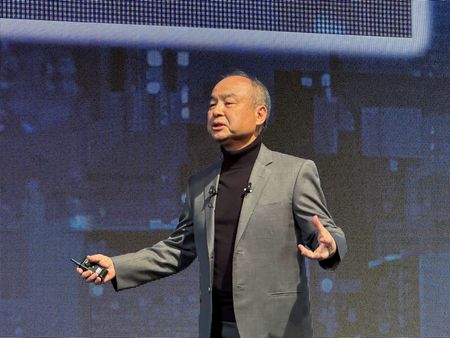By Jeff Mason and Steve Holland
PALM BEACH, Florida (Reuters) -President-elect Donald Trump, with SoftBank Group CEO Masayoshi Son at his side, announced on Monday that SoftBank would invest $100 billion in the U.S. over the next four years in what would be a boost to the U.S. economy.
Trump said in his joint appearance with Son that the investment would create 100,000 jobs focused on artificial intelligence and related infrastructure, with the money to be deployed before the end of Trump’s term.
The Monday announcement echoes a similar pledge Son made with then-President-elect Trump in December 2016 at Trump Tower, when Son said he would spend $50 billion and create 50,000 jobs.
While that money was eventually spent, it is unclear whether those jobs were created.
Trump said SoftBank’s latest investment pledge was evidence of “monumental confidence in America’s future.” He playfully encouraged Son to make the investment of $200 billion. Son chuckled and said that he would try.
The $100 billion pledge, made at a flag-bedecked event at Trump’s Mar-a-Lago club in Palm Beach, Florida, fits in with Trump’s vow to bolster the U.S. economy and reduce the effect of inflation on Americans during his second term, which begins on Jan. 20.
It is unclear how SoftBank plans to fund the investment promise. As of Sept. 30, SoftBank Group had about $27 billion in cash on its balance sheet, according to its most recent earnings report. The company’s Vision Fund 2 also has $3 billion left to deploy. The capital could also come from chipmaker Arm Holdings, a source familiar with the matter said.
Trump called Son “one of the most accomplished business leaders of our time.”
SoftBank has been rebuilding its finances after the failure of high-flying office-sharing startup WeWork and after some of the tech firms it is invested in through its Vision Fund unit fell out of favor among investors. SoftBank shares jumped more than 3% in trading in Tokyo on Tuesday morning following the announcement.
Trump has an affinity for splashy announcements promising thousands of jobs, even though such investments do not always pan out. Early in his first term, he announced a $10 billion investment by Foxconn in a Wisconsin factory that promised thousands of jobs but was mostly abandoned.
“I don’t think there’s a tangible plan in the offing,” said Amir Anvarzadeh, Japan equity strategist at Asymmetric Advisors of the SoftBank announcement.
“The question arises what are they going to buy? There’s already a lot of money chasing fantastic companies. The low-hanging fruit in AI has come and gone,” Anvarzadeh added.
Son has been a strong proponent of the potential for AI and has been pushing to expand SoftBank’s exposure to the sector, taking a stake in OpenAI and acquiring chip startup Graphcore. After a sharp decline in shares between 2021 and 2023, SoftBank stock has recovered, gaining nearly 55% year-to-date.
In October, Son reiterated his belief in the coming of artificial super-intelligence, saying it would require hundreds of billions of dollars of investment.
Son said at the time he was saving up funds “so I can make the next big move,” but did not provide any details.
“We do not expect that the company’s AI investment plans have materially changed,” Astris Advisory analyst Kirk Boodry wrote in a note. “The company is making a pledge largely based on existing commitments.”
Trump promised last week that he would extend fast-track permitting to any company that invests $1 billion or more in the United States.
(Reporting by Jeff Mason and Steve Holland; additional reporting by David Shepardson, Rishabh Jaiswal in Bengaluru, Rocky Swift and Anton Bridge in Tokyo, Susan Heavey in Washington, and Krystal Hu in Toronto; Editing by Colleen Jenkins, Ross Colvin, Nick Zieminski and Jamie Freed)

